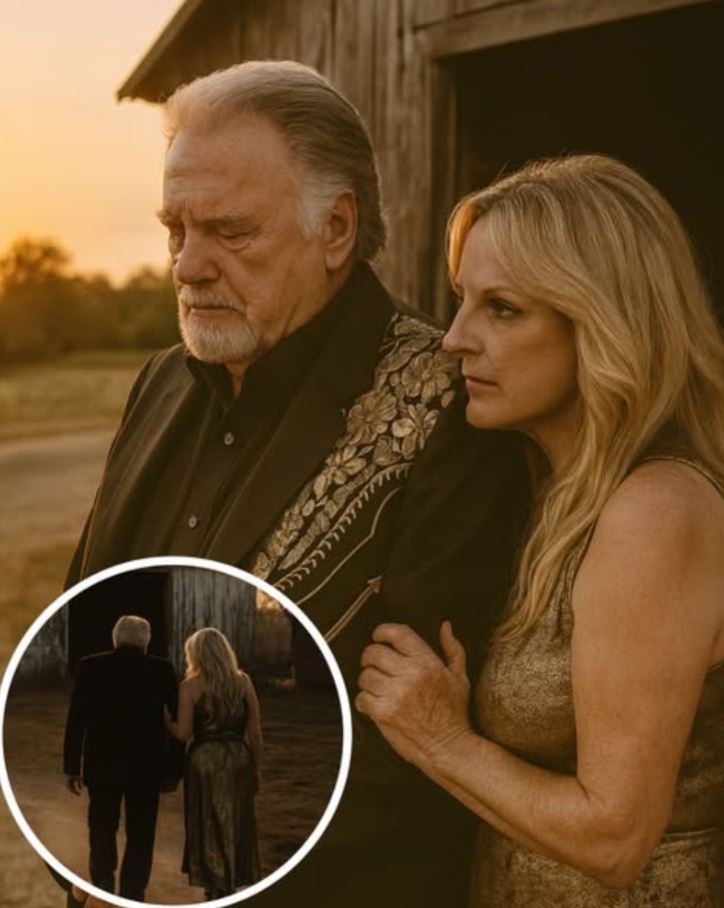
At 77 years old, country music legend Gene Watson took a slow, steady walk down a quiet gravel road in his Texas hometown. Time may have softened his steps, but it had not dimmed the strength of his spirit. Walking beside him was 62-year-old Rhonda Vincent, the beloved “Queen of Bluegrass”, her hand resting gently on his arm. Their walk was not a performance—it was a pilgrimage.
There were no microphones, no cameras, no flashing lights. Instead, only the weathered outline of an old barn stood before them—the very place where a young Gene Watson first lifted his voice. The air carried whispers of long-forgotten nights, and the fading sunlight turned the dust into golden smoke curling upward like memory itself.
They stopped at the barn’s entrance. Silence lingered. Watson closed his eyes, as if listening for the echoes of his younger self. Vincent stood quietly, reverent, as though protecting a sacred moment.
Then, in a voice aged by years yet steady with conviction, Gene spoke:
“This is where I first believed a song could outlive me.”
Those words hung in the air like a prayer, uniting past and present—not as a staged performance, but as a heartfelt truth whispered from the soul.
A Legacy Written in Song
For more than five decades, Gene Watson has embodied the essence of authentic country music. Known as the “Singer’s Singer,” his classics—like “Love in the Hot Afternoon” (1975), “Fourteen Carat Mind” (1981), and the timeless farewell ballad “Farewell Party”—are more than hits; they are living testaments to love, hardship, and resilience. His voice has never been just sound—it has always been a vessel for storytelling, carrying the weight of human experience.
By his side, Rhonda Vincent’s presence made this moment even more profound. At 62, she has carved out her own remarkable legacy in bluegrass, a genre she has elevated with her dedication to tradition, strength, and authenticity. For Vincent, music is not just entertainment—it is heritage, a lifeline connecting generations. Her walk with Watson symbolized exactly that: the eternal bond of music that refuses to fade with time.
More Than a Memory—A Pilgrimage
This gathering at the old barn was not planned for the spotlight. It wasn’t about publicity. It was an intimate return to roots, a reminder of where it all began. The barn itself stood as a symbol—aged and worn, yet unbroken, much like Watson himself. For Vincent, standing there beside him was more than companionship; it was bearing witness to living history.
Gene Watson’s quiet words revealed the timeless truth of every great artist:
When the stage grows dark and the voice grows quiet, the song still lives on.
It lingers across generations, carrying memory forward, linking past and future, proving that music never truly dies.
The Image That Fans Will Never Forget
For fans of country and bluegrass, the vision of Gene Watson and Rhonda Vincent walking arm in arm toward that barn is far more than a touching scene—it is a symbol of what music really means. Songs are not just lyrics or melodies. They are lifelines. They outlast the singer. They hold our stories, our pain, our joy, and carry them into tomorrow.
As the sun dipped low and shadows stretched across the gravel road, silence settled once more. But it was not empty silence. It was filled with promise.
Because once a song is born, it never truly fades.
✨ This hauntingly beautiful moment between Gene Watson and Rhonda Vincent reminds us why country and bluegrass endure—not as trends, but as traditions that keep our stories alive.
